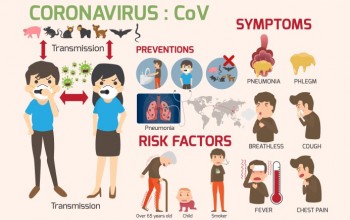According to the CDC, the virus is thought to be spread mainly from person-to-person. This means it may spread between people who are in close contact with one another (within about 6 feet), or through respiratory droplets when an infected person coughs or sneezes. These droplets can land in the mouths or noses of people who are nearby or possibly be inhaled into the lungs. COVID-19 may be spread by people who are not showing symptoms.
The CDC also reports that it may be possible for someone to get COVID-19 by touching a surface or object with the virus on it, and then touching their own mouth, nose, or possibly their eyes, but this is not thought to be the main way the virus spreads.
The best way to prevent illness from COVID-19 is to avoid being exposed to the virus, as there is currently no vaccine to prevent COVID-19.
Person-to-Person Transmission
Experts believe the virus that causes COVID-19 spreads mainly from person to person. There are several ways this can happen:
Droplets or aerosols. When an infected person coughs, sneezes, or talks, droplets or tiny particles called aerosols carry the virus into the air from their nose or mouth. Anyone who is within 6 feet of that person can breathe it into their lungs.
Airborne transmission. Research shows that the virus can live in the air for up to 3 hours. It can get into your lungs if someone who has it breathes out and you breathe that air in. Experts are divided on how often the virus spreads through the airborne route and how much it contributes to the pandemic.
Surface transmission. Another way to catch the new corona virus is when you touch surfaces that someone who has the virus has coughed or sneezed on. You may touch a counter top or doorknob that's contaminated and then touch your nose, mouth, or eyes. The virus can live on surfaces like plastic and stainless steel for 2 to 3 days. To stop it, clean and disinfect all counters, knobs, and other surfaces you and your family touch several times a day.
Fecal-oral. Studies also suggest that virus particles can be found in infected people's poop. But experts aren't sure whether the infection can spread through contact with an infected person's stool. If that person uses the bathroom and doesn't wash their hands, they could infect things and people that they touch.
The virus most often spreads through people who have symptoms. But it is possible to pass it on without showing any signs. Some people who don't know they've been infected can give it to others. This is called asymptomatic spread. You can also pass it on before you notice any signs of infection, called presymptomatic spread.
Community Spread
Sometimes, a person can trace how they got the virus because they know that they've been in contact with someone who's sick. In other cases, the cause is unknown. Community spread is when someone gets the virus without any known contact with a sick person.
Pets and COVID-19
A few pets have tested positive for the new corona virus. Not all of these animals had signs of illness, but some have had mild symptoms. The animals may have caught the virus from close contact with humans who were infected.
Public health officials say they are still studying COVID-19 but that there’s no evidence that pets play a role in its spread.
How Easy Is It to Get Infected?
Researchers say that on average, every person who has COVID-19 will pass it on to 2 or 2.5 others. One study says that number is even higher, with one sick person infecting between 4.7 and 6.6 others.
Can the corona virus be transmitted through the air?
Studies to date suggest that the virus that causes COVID-19 is mainly transmitted through contact with respiratory droplets rather than through the air.
Can COVID-19 spread through food?
It is highly unlikely that people can contract COVID-19 from food or food packaging. COVID-19 is a respiratory illness and the primary transmission route is through person-to- person contact and through direct contact with respiratory droplets generated when an infected person coughs or sneezes.
There is no evidence to date of viruses that cause respiratory illnesses being transmitted via food or food packaging. Corona viruses cannot multiply in food; they need an animal or human host to multiply.
Can I Get Infected From Delivery Food, Packages, or Groceries?
It's highly unlikely that you'll catch COVID-19 from packages, groceries, or food. The important thing is to limit your contact with other people. If you do your own shopping, try to keep at least 6 feet away from others in the store. That might not be possible all the time, so wear a face mask, too. If you use a delivery service, have them leave groceries, food, or packages outside your front door if you can.
Wash your hands for at least 20 seconds before and after bringing things into your home. If you want, you can wipe down plastic, metal, or glass packaging with soap and water. Then clean and disinfect counter tops and anything else you or your bags have touched.
Email:- sales.livsafe@gmail.com
Phone:- +91 9506020282
Reference

